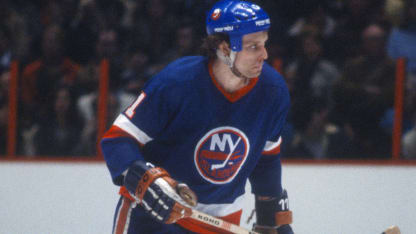The core of Bill Torrey's Dynasty Islanders is well represented in the Hockey Hall of Fame.
Hockey's greatest coach, Al Arbour, was surrounded by the inimitable Denis Potvin, Mike Bossy, Bryan Trottier, Clark Gillies and Bill Smith, each a hockey legend.
"They were -- so to speak -- my howitzers; the big guns in the artillery," Radar, the coach, once noted. "But any general will tell you that the foot soldiers -- the grunts, the hockey infantry -- they are essential for victory. And that's how it was with our club."
Maven's Memories: Wayne Merrick Makes Mark on Cups
Stan Fischler profiles checking center Wayne Merrick

By
Stan Fischler
Special to NHL.com
Wayne Merrick, out of Sarnia, Ontario, was one of those glorious grunts. But before we get to him, let's roll back the calendar and examine how the beanpole center wound up in Uniondale.
Starting with the Islanders inception in 1972, Bow Tie Bill and his super scout -- later assistant GM -- Jim Devellano were tasked with the painstaking job of sculpting a well-balanced roster.
"We knew that, over time, we had acquired very special players in Potvin, Bossy, and the other future Hall of Famers," said Devellano. "But Bill and I knew all along that the great ones had to be complimented by the fellows who worked the corners and did other 'dirty' work."
Bob Nystrom was one of the originals along with Garry Howatt and, soon, Bob Bourne. The first pair of playoff years, 1975 and 1976, reiterated the value of Ny, Howie and Bournie; not to mention J.P. Parise and Jude Drouin who were imported during the 1974-75 campaign.
Devellano: "Mind you, this was before the 1980 Butch Goring deal. A couple of years earlier we were looking for a big, grinding center. It took a while but we finally were able to swing a deal. We wanted a strong, gritty player as a second or third-liner."
Circumstances played in the Islanders favor dating all the way back to the late 1960's-early 1970's when a tall, thin, teenager was starring for the Junior Ottawa 67's. He had future NHLer written all over.
His name was Wayne Merrick and, by coincidence, Devellano had once been on the St. Louis Blues scouting staff and knew all about Merrick and his substantive contribution to the Ottawa sextet.
But Devellano had left the Blues during internal convulsions among management that also saw Scotty Bowman exit the club. Still, the new hockey order in St. Louis also knew about Merrick.
The Blues high command had listed Wayne high on its "Get Him" list knowing, of course, that another club might snatch Wayne earlier. But the Blues had to impatiently wait.
The year 1972 was an expansion season and the brand, new Islanders picked first. Torrey landed right wing Billy Harris while the NHL's other new franchise, the Atlanta Flames, selected Jacques Richard with the second pick.
MAVEN'S MEMORIES
WRITTEN COVERAGE
Don't Forget Tomas Jonsson
The Underrated Stefan Persson
Stan's Favorite Clark Gillies Memories
From Doghouse to Penthouse in 1975
Al Arbour's Trifecta
Giving Away the Banks of Gifts -- Almost
Ken Morrow's Moments
First Isles-Rangers Game
Maven's Haven
Nursing their ninth overall pick, the Blues watched the likes of Bill Barber and Dave Gardner -- eighth -- picked ahead of the St. Louis slot. With the ninth pick, the Blues got their man, Merrick.
"Wayne wasn't exactly a whiz-bang," one scout reported, "but gradually he put up decent numbers for the Blues. It certainly wasn't a bad pick."
Merrick played well enough for the Blues but not so well that he wasn't traded to the California Golden Seals. While skating for the Oakland-based team wasn't exactly purgatory, it certainly wasn't fulfilling Wayne's dream of skating for a Cup contender.
Feeling like a human ping pong ball, Merrick next wound up with the short-lived Cleveland Barons but the big bounce soon would come. At long last, the break arrived when the Isles grabbed him in yet another first-class Torrey deal.
"J.P. Parise had done wonders for us," said Bowtie Bill, "and we'll never forget him for that sweet overtime goal against the Rangers. Same with Johnny Potvin. We loved what he brought to the team -- including his kid brother, Denis -- but what we needed most of all was a Merrick kind of center." Parise and Potvin moved to Cleveland while the Islanders got their man.
Author-historian Andrew Podnieks understood what "a Merrick kind of center" meant to Torrey. In his definitive scouting report-tome, "Players, The Ultimate A To Z Guide," Podnieks pointed out that Merrick found his perfect hockey niche on Long Island.
"The Islanders," noted Podnieks, "wanted Merrick to be part of their puck puzzle. When he came to them, Wayne played on a third (Banana) line with John Tonelli and Bob Nystrom. It became the top checking line in the league. Come playoffs, though, they also contributed on offense."
When Merrick joined the Isles in early 1978, Wayne's dream of playing on a Stanley Cup-winner remained just as it was when he was an eight-year-old watching on tv the likes of Montreal Hall of Fame center Jean Beliveau drinking from Lord Stanley's mug.
The irony of it all was that when the spring of 1980 had arrived and the Islanders had reached Game Six of the Cup Final, Merrick was sidelined with an injury. His center ice replacement was swing-man Lorne Henning.
It was Henning who passed the puck to Tonelli who then lateralled it to Nystrom for the sudden death Cup-winner. No sweat for Wayne; what mattered was that his name was engraved on the 1980 edition of the trophy.
What's more, it meant so much to him that -- prior to the 1980-81 -- season, Wayne and his wife, Carol, drove 200 miles from their Sarnia farm to the Hockey Hall of Fame in Toronto.
"I had to go there," Merrick explained, "to see my name on The Cup."
Of course, it was impossible to know it then, but the regulation 80-81 season would prove to be a springboard to still bigger successes for Merrick. At first, he wasn't getting the ice time he thought he deserved but -- wisely, I might add -- he played the good soldier and waited for Al Arbour to point the baton in his direction.
Merrick took the cue and played his best hockey with some of his best sidekicks.

© Focus On Sport/Getty Images
When in sync "The Banana Line" (Merrick-Nystrom-Tonelli) was as "clutch" as any in the league, playing the full 200-foot game. And when the 1981 playoffs began, Wayne's game awakened as never before.
"Most teams have two strong lines," asserted former Islanders defenseman Dave Langevin. "What made our championship teams so strong is that we have four lines. Not only that but our third and fourth lines were better than most team's second lines.
"A defenseman relies heavily on the center man in regard to defensive coverage. Wayne was one of the most trusted centers on our team. One of his assets was that he was strong on his feet."
Langevin noted that Merrick was "strong on his feet" and an excellent face-off man.
Langevin: "He won so many face-offs because he had forearms like the cartoon character Popeye, the sailorman. His face-off superiority enabled us to control opposing players."
Al Arbour agreed that his third and fourth lines won many games for him and was a reason the Isles could do what no other team could -- win 19 playoff series in succession.
"Al would line up Wayne against the opposing team's best lines. I assure you that our team never doubted Wayne's ability to handle any player on any team."
What was so surprising -- from a journalist viewpoint -- was that the New York Times Pulitzer Prize-winning columnist Dave Anderson singled out Merrick for his main profile column, bypassing the future Hall of Famers. One good reason was that Wayne had become one of the Islanders top scorers in the 1981 Final round against Minnesota.
The headline above Anderson's story after the Isles took a 3-0 lead in games said it all:
THE CUP EMBODIES MERRICK'S DREAMS.
"Merrick's magnificent obsession has always been with the Stanley Cup itself," Anderson observed. "As a journeyman center he's always considered the team trophy to be the extent of his dream that came true."
But it hadn't come true quite yet. Minnesota won Game Four of the series, sending it back to Uniondale. The defeat caused a slight but noticeable sense of unease among fans, not to mention Wayne, himself.
In fact, Merrick was so concerned about the possibility that his mates would lose their focus that he decided to step out of quiet-character and address his fellow troops in a dressing from lecture.
Merrick: "I reminded my teammates what's at stake. I reminded them that we have the opportunity of a lifetime to win The Cup again."
Wayne then put his words into action and it again caught the attention of press box critics.
One reporter commented that "Merrick has become the Islanders most effective checking center." Frankly, Wayne never felt better about his game.
"I really feel fulfilled now," he allowed. "I know that I've worked hard for it. This is what I dreamed about as a kid. It's why -- for me -- even winning a couple of face-offs makes for a happier life."
Wayne was even happier when columnist Anderson told him that he was among the team's leading scorers in the Final round. "I didn't know that," he responded.
But he knew that his dream was fulfilled in Game Five in which the Isles eliminated Minnesota and won their second consecutive title. Overall, Merrick played in all 18 postseason games, delivering six goals and 12 assists for 18 points. Not to mention a plus-12.
Anderson, who had been covering the NHL for more than a quarter of a century, put Merrick in a class with the Isles' Hall of Famers in terms of Wayne's contribution to the championship.
"Merrick never received much recognition either as one of the Islanders who toil in the shadows so willingly. But on any championship team stars would not be stars without supporting actors who understand their roles."
That second Stanley Cup triumph was, of course, not the end of the crusade. New York Post columnist Larry Brooks, who had covered the Isles during those dynasty years, took note of Wayne and his infantrymen. Larry pointed out how vital they were in producing four Cups and an untouchable record of 19 consecutive playoff series wins.
"You know most of the names by heart," wrote Brooks, "but maybe you've forgotten or don't quite remember the others who were there for all four Cups as well."
Wayne Merrick was one of those glorious grunts! And, I might add, one of the very best.


















